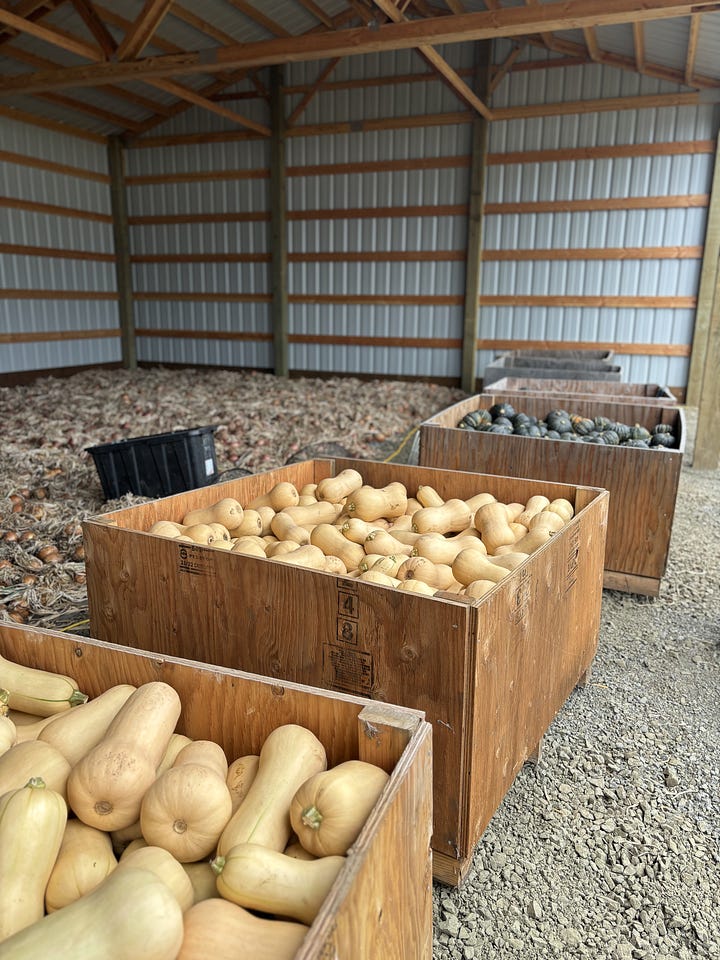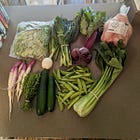Hundreds and hundreds of delicata squashes. Lined in neat rows perpendicular to the barn. One row an Oregon native breed. The next, Candystick. The one beyond that, Honey Boat.
I smiled at their names. How endearing, I thought.
Barbara Kingsolver’s Animal, Vegetable, Miracle came to mind. A beautiful memoir in which she spends a large portion of an early chapter recounting the vast diversity of crop seeds available for sale. Never had I thought about how many varieties of a specific plant exist. Especially like that of a delicata squash, thinking the type of squash (butternut, acorn, kabocha, etc.) was the variety, and not knowing there were varieties within the squash species themselves.
The difference, seeing their rows alongside one another now, was obvious. A bright yellow lined with thin green stripes the Oregon-bred. The Honeystick much golder in its tone, so that when held next to the Oregon-bred it looked almost orange.
This past Wednesday I volunteered at Flying Coyote Farm, where I get my CSA (community supported agriculture) share. This is the second year, or third season (two summer shares and one winter share), my partner and I have bought their produce.
I briefly mentioned this in an earlier post where I talked about my passion and curiosity for knowing where my food comes from.
Last summer when the farm sent out a note advertising their annual CSA member volunteer day, I immediately clicked in, only to be disappointed by it being a week day option only. But when the chance came around this year, I looked at my PTO balance and thought, what the hell. I’m taking the day off work to try this!
I wasn’t sure what I was more enticed by—the opportunity to tour the farm where I’ve been getting so much food from, or the chance to dig my hands into the earth.
I’ve had a yearning desire for a while now to try some farming, since I don’t have much space at home to grow any food of my own besides strawberries. So this was more about fulfilling that curiosity inside me than it was volunteering. In fact, it didn’t feel like volunteering at all. I felt my cup instantly filling the moment I got there, despite feeling a little out of my comfort zone at first.




I squatted down in the field, level with the squash as the morning sunlight shone upon my face. My face, still waking from the coffee I chugged as I drove to the farm, willing myself awake for whatever work lie ahead.
I grabbed a rag and quickly got into a rhythm, wiping the dirt and water droplets off the squash, one by one. Stacking them into a small black crate to be a emptied into a pallet-sized wooden crate when it was full.
Many hands made quick work and the squash disappeared faster than my morning coffee.
Perfect timing, because the rainclouds rolled in shortly after, teasing us with a drizzle that threatened to turn to downpour any minute.
I’m not sure if it was the original plan, but as farmers must do, we pivoted. The afternoon was spent in the warm, dry cocoon of the greenhouse, damp with the pungent smell of onions.
It was a faint, but unmistakable smell. One that hit your nostrils as soon as you walked into the greenhouse, but that quickly dissipated as you spent time in there. For the only companions besides my fellow human beings were the rows and rows of onions—red, white, yellow.
Me, another CSA member, and two of the farm’s staff were tasked with clipping onions for storage. It was remarkable how meditative the process felt, especially with a soundtrack of rain pattering the roof.
Just like wiping the squash, one by one, so it went with the onions. Grab an onion. Clip the bottom root off. Clip the top shoot off. Put it the in bin. Repeat.


Every now and then I’d come across a questionable one, its sprouted tendrils having overshot themselves so that clipping them exposed the juicy insides of the onion to the air. A no-no for storage, these went into a separate bin for the farm’s employees to eat soon or to be tossed.
I felt great responsibility in these moments, for my judgment was what decided whether the farm’s customers got a good onion or a bad one. Clip it too much and we’d risk a customer ending up with an onion gone moldy by the time they got their hands on it.
The risk level wasn’t as dire for the squash. Very rarely did those have any mushy spots. It was mostly a matter of presentation for them.
I sensed I was being more meticulous than I needed to be, as the bins of my neighbors seemed to fill up a lot faster than my own. I wondered if I should try to work faster, to keep up. But instinct told me that a good product was more important for the farm than pure productivity.
I took great care to remove all the dirt spots from the squash and clip the onions just so, for I knew exactly what it was like to receive one—I was a customer myself, after all! I was representing the farm with my work. Somehow it felt like a great honor, the fact that the farm was entrusting us with doing such an important job.
For that was just it—farming is an important job. An essential one that is often overlooked. That was why I wanted to partake in the process myself, I later realized. To understand what it is that so many of us take for granted.
As I drove home, physically exhausted from a day spent in the field (imagine how exhausted I’d be if I were actually digging!), I found the silence in my car comforting as I processed the day’s experience. I didn’t need the distraction of a podcast or music, instead my mind having plenty to think about.
Perhaps even more nourishing than meditatively cleaning the crops themselves was conversing with the crew. A medley of farm staff, farmer’s market volunteers, and a few CSA members (we were the minority), I exchanged dialogue with several of them as we rotated our positions in the field. We all enjoyed lunch and an afternoon break together. The conversation became more intimate when our group dwindled to four in the onion tent.
It was oddly reminiscent of the retreat I went on last summer. Perhaps because of the farm locale, and/or sitting at a long table eating and conversing with strangers, I felt connected as the topics reached a different depth due to the diverse backgrounds we all found ourselves there from. My thirst for knowledge around the food and farming community satiated by this group of folks who very much embedded in it. Who live and breath it every day.
That night I felt a deep desire to cook a homemade dinner from the farm’s produce I knew lie in wait at home. Using two kinds of melons, cherry tomatoes, and heirloom tomatoes from Flying Coyote (accompanied with local-ish Mama’s Lil Peppers), I threw together this salad from Six Seasons, accompanied with CSA potatoes that I smash roasted with rosemary butter from this recipe. It felt all the more satisfying to consume, having touched the very rows of soil where these ingredients came from. Nourishment at its finest.
Thinking about it now, how special it was for all the constituents of the farming community to be represented that day. From the growers and tenders of the land themselves, to the farmer’s market workers who provide a space for the farm to sell their produce, to the end consumers like me who happily eat the fruits of their labor.
Is there not a truer community around food than that?
If you enjoyed this post, you might like these:









So cool! Seems like your PTO day was well worth it. Some companies have volunteer days, that would have been cool too.
This sounds like such a cool experience, Morganne! I can totally see how feeling connected to the community around food would help you feel more connected to the food itself. It makes me want to try something like this as well (and/or come over to your place for dinner! haha).
P.S. I love this line: "a soundtrack of rain pattering the roof." There was so much beautiful, descriptive language in this post!